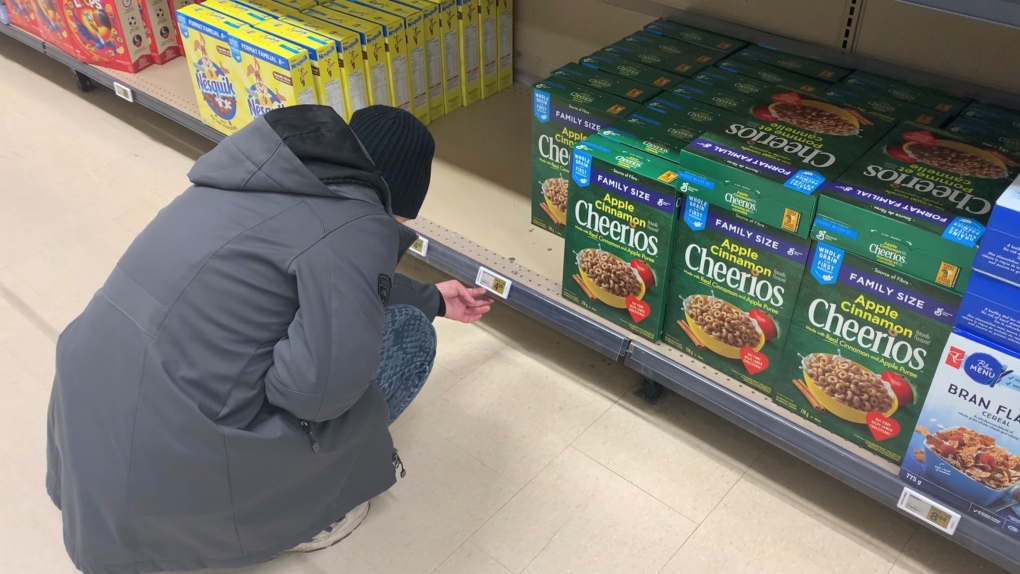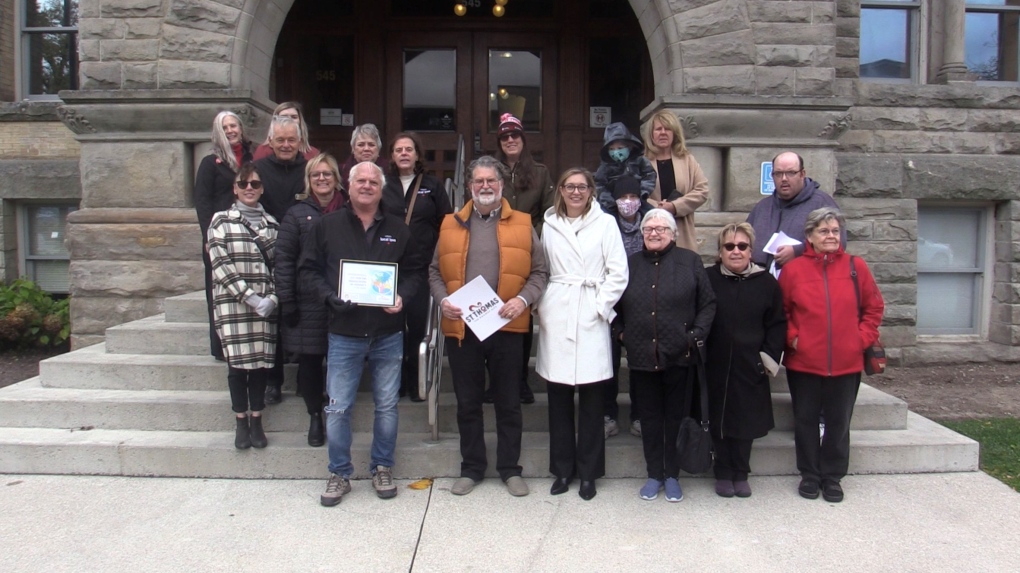‘Pay rent or buy food?’: People living in poverty having to make tough choices
As she walks through a St. Thomas, Ont. grocery store, Elizabeth Windover needs to be disciplined on a tight budget.
“I make sure that I don't do the impulse buy stuff,” says Windover, who lives pay cheque to pay cheque on Ontario Works and Child Tax Benefit.
She makes precise lists ahead of time because she rarely has enough money to buy extra food for herself and four children after monthly expenses.
“If it’s not on special, am I buying one box or two? How badly do I need to buy it? Can it wait until I have more money in a couple of weeks?”
Those are the questions she asks herself as she puts food in her cart.
 Elizabeth Windover checks the price of cereal before making a purchase at the grocery store in St. Thomas, Ont. on Monday, Oct. 17, 2022. Windover shops on a tight budget each month. (Brent Lale/CTV News London)“When we work with people we always talk about budgets,” says Donna Rankin, poverty interventions coordinator with YWCA St. Thomas.
Elizabeth Windover checks the price of cereal before making a purchase at the grocery store in St. Thomas, Ont. on Monday, Oct. 17, 2022. Windover shops on a tight budget each month. (Brent Lale/CTV News London)“When we work with people we always talk about budgets,” says Donna Rankin, poverty interventions coordinator with YWCA St. Thomas.
“Historically we talk about 35 per cent (monthly income) goes for housing that includes your rent or your mortgage, and your utilities and then 65 per cent is available for food and other necessities. It is flipped now, with the rise in rents and mortgages. It's impacting people's ability to feed themselves and feed their children,”
Rankin cites a recent instance where a woman didn’t eat for two full days so her children could be fed.
Monday at St. Thomas City Hall, an awareness ceremony was held to recognize International Day for the Eradication of Poverty.
Statistics show 16 per cent of St. Thomas Elgin-Residents live in the low-income cut off rate, and one- in-five children struggle with food security.
“Parents are making impossible choices,” says Kelly Zeigner, president and CEO of United Way Elgin-Middlesex.
“They are choosing between rent or food on the table. New boots for school, or pay the hydro bill?”
 The Elgin Coalition to End Poverty met in front of City Hall in St. Thomas, Ont. on Monday, Oct. 17, 2022 to bring awareness to difficulties facing residents in the region. (Brent Lale/CTV News London)The Elgin Coalition to End Poverty recommends writing letters to your local MPP to ask for increased funding for OW and ODSP and also says people should support companies that pay a living wage.
The Elgin Coalition to End Poverty met in front of City Hall in St. Thomas, Ont. on Monday, Oct. 17, 2022 to bring awareness to difficulties facing residents in the region. (Brent Lale/CTV News London)The Elgin Coalition to End Poverty recommends writing letters to your local MPP to ask for increased funding for OW and ODSP and also says people should support companies that pay a living wage.
“Experiences of homelessness are truly visible in the downtown area of St. Thomas, but we also know that much of what folks are experiencing is hidden and invisible,” says Lindsay Rice, executive director of YWCA St. Thomas.
“When you think about that iceberg and you think about you know the size and scope beneath of it. That's what we're really trying to illuminate is that there's a large population, struggling day-to-day to make their basic needs met.”
Windover shops where she gets points as a kickback, and says she rarely purchases anything not on her list. She believes taking the time to pre-plan is the key.
“I stock up on stuff especially when it's on sale, so that I don't have to worry about running out of food,” she says.
“I make sure that I have enough food to feed my family so that I don't have to go to the food bank because there are other people that need that food at the food bank more than I do. I have the ability to pre plan and I have the ability to store food and so many other people don't have that.”
CTVNews.ca Top Stories
7 suspects, including 13-year-old, charged following 'violent' home invasion north of Toronto
Seven teenage suspects, including a 13-year-old, have been arrested following a targeted and “violent” home invasion in Vaughan on Friday, police say.
After Trump's Project 2025 denials, he is tapping its authors and influencers for key roles
After being elected the 47th president on Nov. 5, Donald Trump is stocking his second administration with key players in the Project 2025 movement he temporarily shunned.
Widow of Chinese businessman who was executed for murder can sell her Vancouver house, court rules
A murder in China and a civil lawsuit in B.C. have been preventing the sale of multiple Vancouver homes, but one of them could soon hit the market after a court ruling.
These vascular risks are strongly associated with severe stroke, researchers say
Many risk factors can lead to a stroke, but the magnitude of risk from some of these conditions or behaviours may have a stronger association with severe stroke compared with mild stroke, according to a new study.
Retiring? Here's how to switch from saving for your golden years to spending
The last paycheque from a decades-long career arrives next Friday and the nest egg you built during those working years will now turn into a main source of income. It can be a jarring switch from saving for retirement to spending in retirement.
Lotto Max jackpot climbs to $80M, tying record for largest prize
The Lotto Max jackpot has climbed to $80 million for just the second time in Canadian lottery history.
Canadian neurosurgeons seek six patients for Musk's Neuralink brain study
Canadian neurosurgeons in partnership with Elon Musk's Neuralink have regulatory approval to recruit six patients with paralysis willing to have a thousand electrode contacts in their brains.
Black bear killed in self-defence after attack on dog-walker in Maple Ridge, B.C.
A black bear has died following a brawl with a man on a trail in Maple Ridge, B.C.
Trump picks Brooke Rollins to be agriculture secretary
U.S. President-elect Donald Trump has chosen Brooke Rollins, president of the America First Policy Institute, to be agriculture secretary.

































